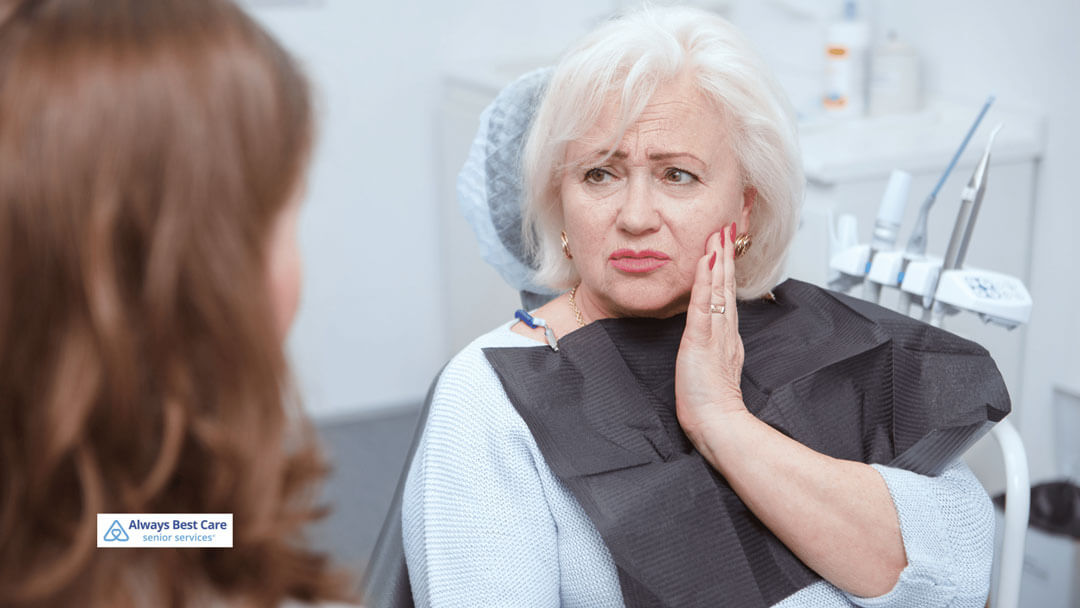Dental Care: Managing Common Oral Health Problems for Seniors

Good oral hygiene can do more than keep your teeth and gums healthy—it helps you continue enjoying the foods you love.
It’s important to stay on top of oral health as we age because minor issues can lead to more significant problems over time. Seniors face unique challenges in dental care, but these problems can be managed effectively with the right approach.
Let’s look at the most common oral health concerns for seniors and how to address them.
Table of Contents
Understanding the Aging Process and Oral Health
Aging naturally impacts the body, and the mouth is no exception.
Changes like reduced saliva production and the wearing down of tooth enamel are common. Gum tissue may recede, exposing more of the tooth and making it vulnerable to decay.
5 Common Oral Health Problems in Seniors
Gum Disease: A Leading Concern
Gum or periodontal disease is a severe dental issue in older adults.
If untreated, plaque build-up around the teeth leads to irritation, bleeding, and tooth loss.
Brushing and flossing regularly and routine dental checkups are key to preventing this condition from worsening.
Tooth Decay and Cavities: Prevention and Care
Older adults are more prone to tooth decay, especially if they suffer from dry mouth or have a diet high in sugar. Cavities often develop at the roots of teeth where gum tissue has receded.
Preventing decay involves brushing with fluoride toothpaste, limiting sugary foods, and scheduling regular dental cleanings.
Managing Dry Mouth in Seniors
Dry mouth is a common issue, often caused by medications or changes in saliva production. Without enough saliva, the mouth can’t naturally cleanse itself, increasing the risk of decay.
Staying hydrated, chewing sugar-free gum, and using specialized mouthwashes can help relieve dry mouth.
Tooth Sensitivity: Causes and Solutions
Many seniors experience increased tooth sensitivity due to worn enamel or exposed roots. This can make eating or drinking certain foods uncomfortable.
Sensitivity toothpaste and fluoride treatments can reduce discomfort, and more severe cases may benefit from dental procedures covering exposed areas.
Denture Care and Maintenance
For seniors with dentures, proper care is essential for comfort and oral health.
Dentures should be cleaned daily and soaked overnight to prevent bacteria build-up. Ensuring they fit correctly is also important, as ill-fitting dentures can lead to sores, infections, and difficulty eating.
The Role of Regular Dental Checkups
Routine dental visits remain crucial, even for those without natural teeth.
Checkups allow dentists to spot problems early, perform cleanings, and ensure dental appliances function well. Regular exams also help in the early detection of conditions like oral cancer.
At-Home Oral Hygiene Tips for Seniors
1. Brush Twice a Day with Fluoride Toothpaste
Brushing teeth twice a day is the foundation of oral hygiene.
Seniors should use a soft-bristled toothbrush, as it’s gentler on gums, and fluoride toothpaste to protect against decay.
Brushing should last for two minutes, covering all areas of the teeth—front, back, and along the gumline.
Fluoride helps to strengthen tooth enamel, making it more resistant to cavities. If manual dexterity is an issue, an electric toothbrush can make brushing easier and more efficient.
2. Floss Daily to Remove Hidden Debris
Flossing is equally important, as it helps clean between teeth and along the gumline, where food particles and plaque tend to accumulate.
Seniors should floss at least once a day, preferably before bedtime. If traditional floss is challenging to use, tools like floss picks or water flossers can offer an easier alternative.
Daily flossing prevents plaque from hardening into tartar, which can lead to gum disease if left unchecked.
3. Use Mouthwash for Added Protection
Incorporating mouthwash into a daily routine provides an extra layer of protection.
An antiseptic mouthwash helps reduce plaque and bacteria, while a fluoride rinse strengthens teeth. Seniors should choose an alcohol-free mouthwash, as alcohol can dry out the mouth, especially if they are already experiencing dry mouth.
Rinsing for 30 seconds after brushing and flossing can help reach areas a toothbrush might miss.
4. Stay Hydrated to Prevent Dry Mouth
Dry mouth is common in older adults, especially those on certain medications.
Without enough saliva, the mouth becomes more susceptible to cavities and gum disease. Staying hydrated by drinking plenty of water throughout the day helps stimulate saliva production.
Chewing sugar-free gum or sucking on sugar-free lozenges can also encourage saliva flow, keeping the mouth moist and reducing the risk of decay.
5. Eat a Balanced Diet for Oral Health
A healthy diet plays a significant role in oral health.
Seniors should consume calcium-rich foods like dairy products to support strong teeth and bones. Avoiding sugary snacks and drinks is important, as they can contribute to cavities.
Instead, seniors can opt for snacks like fruits, vegetables, and nuts, which promote overall health and help maintain a strong, healthy smile.
6. Replace Toothbrushes Regularly
Toothbrushes should be replaced every three to four months or sooner if the bristles are frayed. Worn-out toothbrushes lose their effectiveness in cleaning teeth and can harbor bacteria.
If a senior uses an electric toothbrush, replacing the brush head at the same interval is recommended to ensure optimal cleaning.
Caregiver Assistance with Oral Hygiene
For seniors who struggle with maintaining their oral hygiene routine due to physical or cognitive challenges, caregivers can step in to help.
Caregivers can assist with brushing, flossing, and even ensuring dental appointments are kept. It’s important to use gentle techniques to avoid causing any discomfort, particularly if the senior is dealing with sensitive gums or teeth.
Ensure Your Loved One’s Oral Health with Compassionate Senior Care!
At Always Best Care of Denver, we understand the importance of maintaining good oral hygiene as part of overall senior health. Our compassionate caregivers are here to assist your loved one with their daily oral care routine, ensuring they maintain a healthy smile and avoid common dental issues.
Contact Always Best Care of Denver at (720) 310-6998 to learn more and schedule your free consultation.





